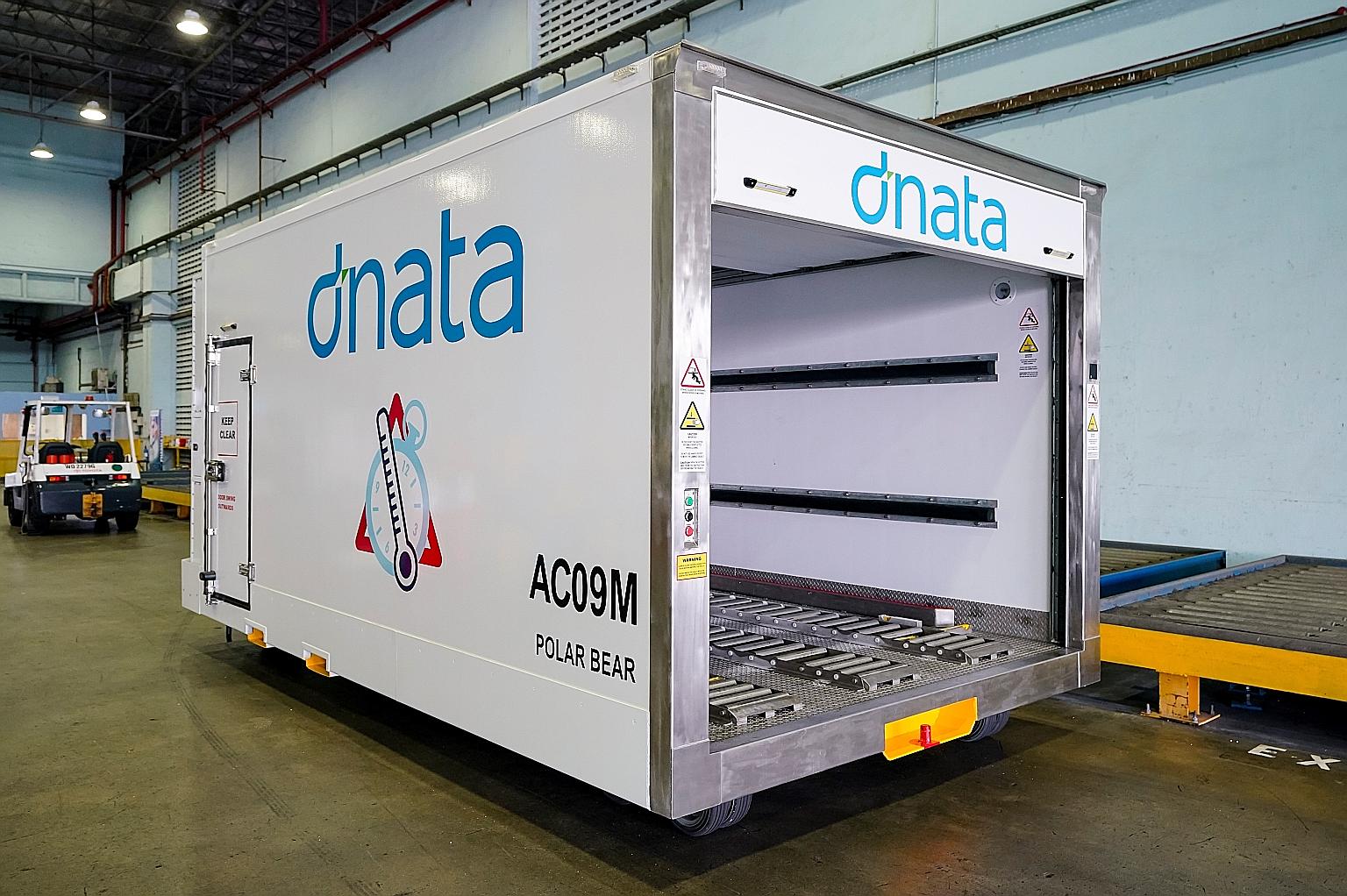Singapore ready for cold-chain transport of Covid-19 vaccines
Launch of high-tech containers further boosts nation's status as a reliable hub for pharma products
Sign up now: Get ST's newsletters delivered to your inbox

The cool dollies launched by dnata last week feature a closed temperature-controlled system that allows temperature-sensitive pharmaceutical goods to be transported between cargo warehouses and aircraft.
PHOTO: DNATA SINGAPORE
Singapore handled more pharmaceutical cargo in the first seven months of this year compared with the same period last year - an increase that comes on the heels of local efforts to boost air transport of temperature-sensitive products like vaccines during the Covid-19 pandemic.
Ground handler Sats - which has about 80 per cent of the market share at Changi Airport - told The Straits Times that it saw a 15 per cent increase in pharmaceutical cargo throughput by weight between January and July, compared with the same period last year.
This increase came despite global flight disruptions due to the pandemic, which reduced total cargo tonnage during this period, said a Sats spokesman on Tuesday after queries from ST.
Sats also said that since the opening of Sats Coolport in 2010 - a purpose-built airfreight terminal that can handle commodities with different temperature requirements - Singapore has attracted a larger market share of pharmaceutical cargo in Asia than its share of general air cargo.
"We have seen this trend continue during this pandemic in supporting the shipment of critical medical supplies, and we expect it to prevail for shipments of the Sars-CoV-2 vaccines when they are ready for distribution also," said the spokesman.
Sars-CoV-2 is the coronavirus that causes Covid-19.
The $16.5 million Sats Coolport has 18 cold rooms and four temperature zones which can store flowers, fruits, meats and medicine.
Ground service provider dnata Singapore also has a temperature-controlled perishable handling centre nearby, Coolchain, which opened in 2013.
Last week, dnata launched cool dollies - high-tech containers that feature a closed temperature-controlled system.
This will allow temperature-sensitive pharmaceutical goods to be transported between cargo warehouses and aircraft, said dnata in a statement.
Mr Lim Ching Kiat, managing director of air hub development at Changi Airport Group, said the cool dolly services further enhance Singapore's status as a reliable and quality air hub for pharmaceutical products and perishables.
"Together with our community, we are preparing for the effective global air transportation of Covid-19 vaccines," said Mr Lim.
Vaccines are biological products that can degrade rapidly with heat, which is why they require a cold chain for shipment, said Professor Ooi Eng Eong, deputy director of Duke-NUS Medical School's emerging infectious diseases programme.
A cold chain is a series of links in the transportation network that ensures vaccines are kept within the temperature ranges in which each one was tested for stability, said Prof Ooi, who is working with American biotechnology firm Arcturus Therapeutics to develop a Covid-19 vaccine which is undergoing clinical trials in Singapore.
Links in a cold chain could include ensuring refrigeration in storage in warehouses, for example, and on board freighters.
Last month, logistics firm DHL released a report on the challenges of transporting Covid-19 vaccines, noting that certain vaccines would likely need to adhere to a stringent temperature requirement of up to minus 80 deg C during transportation and warehousing.
Existing vaccines are conventionally distributed at between 2 deg C and 8 deg C, DHL noted.
The difference in logistical requirements boils down to the types of Covid-19 vaccines currently in development around the world, including some that are based on new or experimental platforms.
Different platforms will likely come with different temperature requirements for transportation and storage, DHL said.
For example, the vaccine co-developed by Duke-NUS and Arcturus leverages an mRNA platform, a new type of vaccine that has never been licensed for human use.
Prof Ooi said the temperature ranges in which vaccines can be stored or transported depends on their preparation.
"Liquid forms generally will need to be kept frozen until they are ready for use," said Prof Ooi.
But vaccines can also be freeze-dried, which would make them more stable and amenable for transportation under refrigerated conditions, he added.
Earlier this month, The Straits Times reported that Arcturus is looking at a lyophilised or freeze-dried version of the mRNA vaccine that could work well at room temperature.
Arcturus president and chief executive Joseph Payne said having a successful lyophilised product, which is a powdered version that needs to be reconstituted on site, removes the need for special ultra-cold freezers, which are costly and uncommon.


